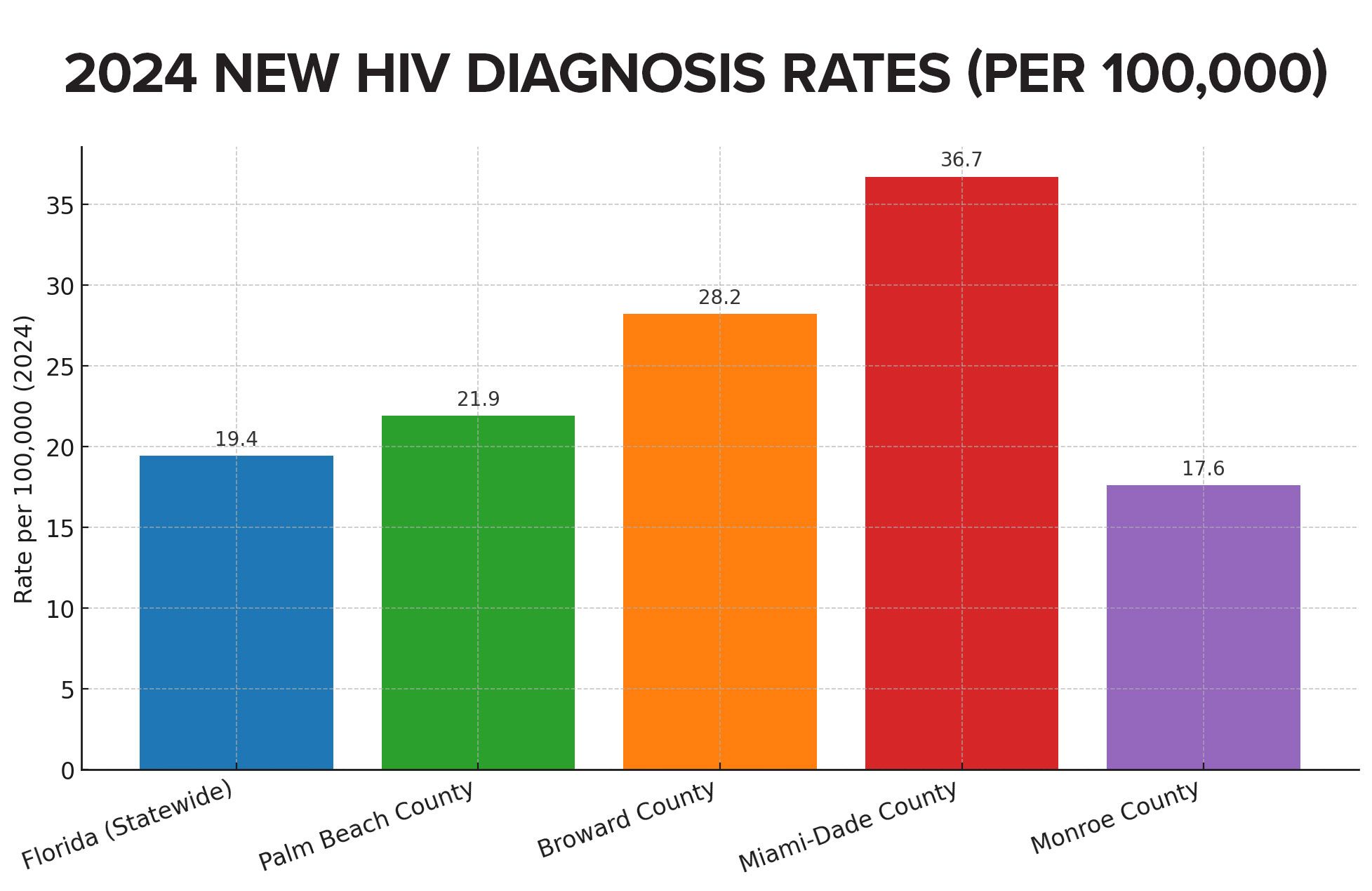At The Pride Center’s recent Founders Circle event, CEO Robert Boo delivered somber news: the organization will not receive state funding for its HIV testing services next year. After 19 years of consistent support, that lifeline has been cut.
In Palm Beach County, Compass Community Center also lost its state funding.
“It was a huge disappointment. Are we surprised? No. But we are devastated,” said Julie Seaver, CEO of Compass. “Without adequate funding, we’re being asked to fight HIV with one hand tied behind our back. Testing is the front line of prevention, and when you cut testing, you’re cutting lives short. It’s just that simple.”
Boo underscored the stakes with data from The Pride Center’s own testing program. Typically, the center diagnoses five or six new HIV cases each year. But in 2025, that number has already more than doubled, with 13 positives reported so far.
“[We] successfully linked each individual to care. This underscores the urgent need for our services,” Boo said. “We remain committed to providing free HIV testing to the community, even without DOH funding.”
According to data released by the Florida Department of Health, there were 4,463 new HIV diagnoses statewide in 2024. Of those, 561 were in Broward County, 341 in Palm Beach County, and 1,027 in Miami-Dade County. Palm Beach saw the largest year-over-year increase at about 27% (rising from 269 new diagnoses in 2023 to 341 in 2024), while Broward and Miami-Dade reported totals nearly unchanged from 2023, differing by only two or three cases. The statewide rate of new diagnoses was 19.4 per 100,000 residents. In South Florida, however, the rates were significantly higher: 21.9 per 100,000 in Palm Beach, 28.2 in Broward, and 36.7 in Miami-Dade.
South Florida also remains the epicenter of the HIV epidemic in the United States, with some of the highest rates of new diagnoses in the nation.
According to the Centers for Disease Control and Prevention, in 2022 — the most recent year with national data — there were 37,981 new HIV diagnoses nationwide. Of those, 52% occurred in the South. The West was the next highest region with 21%.
Who Got Funded
Not every LGBTQ-focused nonprofit was cut. Organizations with a primary focus on medical care — including Latinos Salud and Mayfair Medical — were awarded funds. Other grantees with strong ties to the LGBTQ community include AIDS Healthcare Foundation (AHF), CAN Community Health, and Broward House.
Politics Over Prevention
Seaver argued the issue isn’t budget numbers but politics and language. Applicants were instructed not to use “LGBTQ” in their applications and instead stick to CDC terminology like “MSM” (men who have sex with men) — which effectively erased the trans community and others.
“When I look at the list of awardees, this isn’t about numbers — it’s about neighbors,” Seaver said. “Every test these organizations can’t afford is somebody’s partner, somebody’s child, somebody’s best friend left in the dark.”
Filling the Gap
Compass has depended on state HIV prevention funds for more than 30 years. Founded as the Stop AIDS Project, the organization built its identity around testing and prevention.
Without state money, Seaver and her team are turning to foundations. That support will cover some testing and condom distribution — Compass gives out 12,000 to 14,000 condoms each month — but not enough to sustain its full outreach.
Staff are being shifted to other grant programs while volunteers help keep testing available. But hours may shrink, and sending testers into the community for outreach events will become harder.
“We’re going to continue to provide HIV testing for as long as we can,” Seaver said. “But people aren’t going to pay $75. That’s what happens when you put up financial barriers. People don’t test.”
Boo said the Pride Center will continue their testing services as well. There will be on-campus testing twice a week (Tuesdays and Thursdays) and at select community locations. They will also be distributing At-Home Test Kits to increase access.
“In the long term, we will sustain and expand testing through continued fundraising and by actively pursuing new grant opportunities dedicated to HIV prevention and testing,” Boo said. “Alongside testing, we will also strengthen community education efforts to help reduce new infections.”
A Call to Action
Both Seaver and Boo stressed that the fight against HIV is far from over — and that silence is not an option.
“This isn’t about money. This is about whether HIV is ignored until it’s too late,” Seaver said. “Testing is not optional — it’s essential. We can’t go back to the days of silence and inaction.”
She called on supporters to volunteer, donate, and raise their voices to restore HIV testing funds.
“We’re still here,” Seaver added. “We’re not going anywhere. It might look a little different, but once we’re done grieving, we’ll pull up our pants and get back to work. Because we know what happens when testing isn’t at the forefront — and we can’t let that happen again.”




